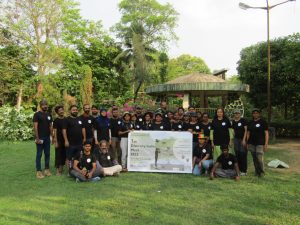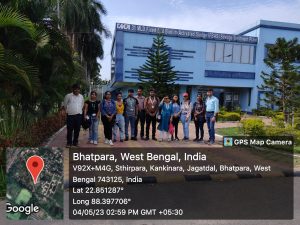M.Sc. Environmental Science and Sustainability
Introduction
The two-year Master of Science (M.Sc.) in Environmental Science and Sustainability program is designed to equip students with advanced interdisciplinary knowledge and practical skills to address pressing global and local environmental challenges. This program integrates critical domains such as Climate Change Science, Sustainability Reporting, Environmental Pollution Management, ESG (Environmental, Social, and Governance) Frameworks, Natural Resource Management, Environmental Economics, and Remote Sensing (RS) and Geographic Information Systems (GIS) applications.
By combining cutting-edge theory, hands-on practice, and real-world exposure, the program prepares students to become industry-ready professionals in the fast-growing domains of sustainability, climate resilience, and environmental management.
Why Study M.Sc. Environmental Science and Sustainability?
- Industry-Aligned Curriculum: Focus on ESG frameworks, sustainability reporting, and climate resilience to meet emerging industry demands.
- Global Relevance: Address contemporary challenges like pollution control, resource management, and environmental governance.
- Career-Ready Skills: Practical exposure through internships, fieldwork, and industry-relevant projects to ensure employability.
- Growth Potential: The global job market for environmental professionals is expected to grow at 6% from 2022–2032, as per the U.S. Bureau of Labor Statistics.
- Tackle Global Challenges: Join the fight against climate change, pollution, and biodiversity loss by becoming a trained environmental expert.
Key Focus Areas
- Climate Change Science: Adaptation, mitigation, and carbon management strategies to combat global warming.
- Sustainability Reporting: ESG frameworks, reporting standards, and corporate sustainability practices.
- Environmental Pollution Management: Monitoring, controlling, and mitigating air, water, and soil pollution.
- Natural Resource Management: Sustainable utilization of natural resources and biodiversity conservation strategies.
- Environmental Economics: Cost-benefit analysis, circular economy principles, and sustainable development economics.
- Remote Sensing (RS) and GIS Applications: Spatial analysis and data-driven decision-making for environmental monitoring.
Program Highlights
- Comprehensive Curriculum: Covers climate science, pollution management, natural resources, and sustainability.
- Research-Oriented Learning: Curriculum emphasizes innovative, technology-enabled solutions to environmental challenges.
- Real-World Exposure: Students gain practical experience through mandatory internships, fieldwork, and industry projects.
- Interdisciplinary Approach: Integrates science, economics, policy, and technology for holistic problem-solving.
- Industry-Relevant Skills: Focus on modern trends like ESG reporting, climate finance, and renewable energy systems.
- Faculty Excellence: Experienced mentors with expertise in academia, research, and industry applications.
Career Opportunities
Graduates of this program are prepared to take on diverse roles in industries, academia, government, and international organizations. Some career pathways include:
- ESG Analysts and Sustainability Consultants
- Climate Risk Assessors and Carbon Management Specialists
- Environmental Policy Advisors
- Environmental Managers in industries, NGOs, and research institutions
- Pollution Control Experts
- Sustainability Officers in Corporate Sectors
- Advanced Research in Environmental Science and Sustainability
Job prospects in
Industry/Private Sector
- Pollution control specialist
- Consultant- Environmental Impact Assessment, Environment, Health and Safety.
- Environmental entrepreneurship.
- Manager- Environment, Sustainability reporting.
- Manager/Process scientist- Water and Wastewater treatment.
- Geoscientist, GIS analyst or Land use planner.
- Environmental remediation
- Green chemist/technologists
- Agricultural Science
- Climatologist/Meteorologist
- Ecologist/Conservation biologist
- Marine Biologist/Oceanographer
- Environmental Data Analysis/Application of Machine Learning in Environmental Science
Job opportunities in
Govt sector
- Indian/State Forest Service
- Indian Environmental Service (Proposed by Govt. of India)
- Scientist in State or Central Pollution control board.
- Specialist in Waste Management/ Contaminant cleanup agencies
- Environmental Impact Assessment reviewer in Ministry of Environment, Forests and Climate Change.
- Auditor- Energy and Environment
- Auditor- Occupational and Chemical safety.
- Coordinator- Public Health, Hygiene & Sanitation
- Environmental Law consultant in National Green Tribunal.
- Ecologists in Govt. sectors.
Hands-On Training
Students will gain practical experience in:
- Advanced environmental monitoring techniques.
- Remote Sensing (RS) and Geographic Information Systems (GIS) applications.
- Laboratory instrumentation such as spectrophotometers, gas chromatographs, and atomic absorption spectrometers.
- Climate data analysis and sustainability reporting tools.
Mandatory Internships and Projects
The program includes mandatory internships with industries, research organizations, and NGOs to ensure real-world exposure. These internships help students translate classroom learning into practical solutions, enhancing their employability and preparing them for challenging environmental roles.
Examples of Internship Opportunities:
- TATA Power
- ERM
- Ultratech Environmental Consultancy
- Manikaran Power
- SGS India
Program USP
- Interdisciplinary Curriculum: Combines science, technology, policy, and economics for a comprehensive approach to sustainability.
- Placement Support: 100% placement assistance in sustainability, ESG, and environmental roles.
- Cutting-Edge Research: Focus on developing innovative solutions to environmental problems through research-driven learning.
- Global Relevance: Prepares students for careers in international organizations, research institutions, and industries.
- Real-World Learning: Emphasis on hands-on training through fieldwork, laboratory analysis, and internships.
With a focus on sustainability, climate resilience, and environmental governance, the M.Sc. in Environmental Science and Sustainability program at Adamas University is the gateway to a successful career in creating a sustainable future.
Programme Educational Objectives (PEO)
PEO1: Preparing Sustainability Professionals
To prepare students for meaningful careers in sustainability-focused fields, including research, industries, environmental consultancies, government agencies, and NGOs, by equipping them with advanced knowledge and skills to address global environmental challenges such as climate change, pollution, and resource management.
PEO2: Driving Innovation in Sustainability
To foster innovation by encouraging students to apply interdisciplinary knowledge to develop solutions for key environmental issues such as sustainable resource management, climate resilience, waste management, ESG reporting, and biodiversity conservation.
PEO3: Real-World Exposure and Professional Training
To provide students with hands-on experience in real-world sustainability challenges through fieldwork, industry internships, socio-economic surveys, research projects, and excursions, while encouraging critical thinking and a scientific temper.
PEO4: Sustainability Communication and Leadership
To develop students’ ability to communicate complex sustainability concepts effectively through scientific writing, presentations, and stakeholder engagement while building leadership skills to address multifaceted environmental challenges.
PEO5: Fostering Global Sustainability Leadership
To instil leadership qualities that enable students to work collaboratively across disciplines and adapt to dynamic global environmental and sustainability scenarios while promoting sustainable development goals (SDGs).
Programme Outcomes (POs)
Programme Outcomes (POs)
PO1: Critical Problem-Solving in Sustainability
Apply quantitative reasoning, statistical tools, and geospatial techniques to analyse and address sustainability and environmental issues.
PO2: Project-Based Sustainability Management
Competently design and manage projects focused on environmental sustainability, including data collection, analysis, and reporting, with an emphasis on interdisciplinary approaches.
PO3: Multidisciplinary Approach to Environmental Issues
Gain expertise in integrating ecological, social, and economic perspectives to tackle sustainability challenges such as climate change, ESG implementation, resource conservation, and pollution mitigation.
PO4: Ethical and Sustainable Decision-Making
Develop a strong ethical foundation and sustainability-oriented mindset to propose socially and environmentally responsible solutions for global challenges.
PO5: Advanced Scientific Techniques for Sustainability
Utilize advanced tools and techniques, including environmental monitoring equipment, ESG reporting frameworks, life cycle assessments, and sustainability modelling, to address real-world environmental and sustainability issues.
PO6: Environmental Monitoring and Risk Assessment
Acquire hands-on experience in environmental monitoring, impact assessment, and risk evaluation, while integrating sustainability considerations into environmental management practices.
Programme Specific Outcomes (PSOs)
PSO1: Climate Change Adaptation and Resilience
Develop expertise in tackling climate change challenges by designing adaptation and mitigation strategies, such as carbon footprint reduction, renewable energy integration, sustainable urban development, and climate-resilient agriculture.
PSO2: ESG and Sustainable Development Practices
Gain proficiency in sustainability reporting and ESG frameworks, enabling students to critically analyse environmental, social, and governance indicators for sustainable corporate and policy practices.
PSO3: Biodiversity Conservation and Nature-Based Solutions
Design and implement biodiversity conservation projects and nature-based solutions, combining ecological principles, community participation, and field-based research to promote sustainable ecosystems and enhance resilience against environmental degradation.
Eligibility Criteria
- Academic Qualification: Bachelor’s degree in Science (B.Sc.), Technology (B.Tech), or any allied discipline from a recognized university.
- Minimum Requirement: 50% aggregate marks in graduation.





